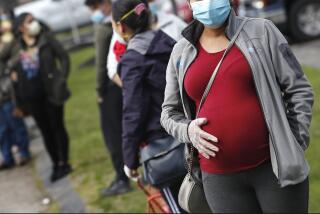Study spotlights severe postpartum mental disorders
- Share via
CHICAGO — Within the first three months after giving birth to their first baby, one of 1,000 women experience schizophrenia, bipolar disorder, depression or some other mental illness severe enough for them to be hospitalized, a major Danish study has found.
The findings underscore a potentially perilous period after delivery when key hormones such as estrogen and progesterone, which are elevated during pregnancy, fall precipitously, possibly triggering mental disorders.
“This is a really important study,” said Dr. Valerie Davis-Raskin, a former associate clinical professor at the University of Chicago, who treats patients with postpartum depression.
“We’ve had a difficult time figuring out what causes postpartum psychiatric illnesses, and I see this study as really strongly supporting a biologic, hormonal or other physical basis,” said Davis-Raskin, who was not involved in the study.
“All women go through this massive hormonal change after delivering a baby,” Davis-Raskin said. “It’s such a stressor on the mother’s brain.”
About 60% to 70% of new mothers experience what is called “baby blues,” a mild mood disorder that lasts one to two weeks. But 10% to 15% suffer postpartum depression, a more serious mental disorder that can last weeks to months.
The Danish study was reported in today’s issue of the Journal of the American Medical Assn. It shows that postpartum psychoses are a bigger problem than generally recognized, Katherine Wisner, professor of psychiatry and obstetrics, gynecology and reproductive sciences at the University of Pittsburgh School of Medicine, wrote in an accompanying editorial in the journal.
Postpartum depression is a major public health problem, Wisner said. She called for universal screening programs to be set up to diagnose and treat mental problems of new mothers. Screening should start at two weeks after childbirth and continue at regular intervals for the first year, she said.
Maternal depression can adversely affect a newborn’s mental and motor development and is associated with poor impulse control, low self-esteem and behavioral problems as the child develops, Wisner said.
Despite effective therapies for depression and psychoses, maternal mental problems are often not recognized or treated, she said.
The Danish study is the first in more than two decades to look at the problem of serious psychiatric disorders in women after childbirth. It is considered important because the health records of all Danish citizens are carefully maintained, including all psychiatric hospital admissions.
The study, headed by Trine Munk-Olsen of the University of Aarhus, involved 630,373 women and 547,431 men who became new parents from 1973 to 2005. The researchers found 1.03 women per 1,000 births suffered from a mental disorder that required hospital admission.
Being a first-time father did not affect the rate of mental disorders among men, Munk-Olsen said. For new fathers, the rate of hospitalizations for mental illness was 0.37 per 1,000 births, a rate that did not differ from the general male population.
“This may indicate that the causes of postpartum mental disorders are more strongly linked to an altered physiological process related to pregnancy and childbirth than psychosocial aspects of motherhood,” said Munk-Olsen.






